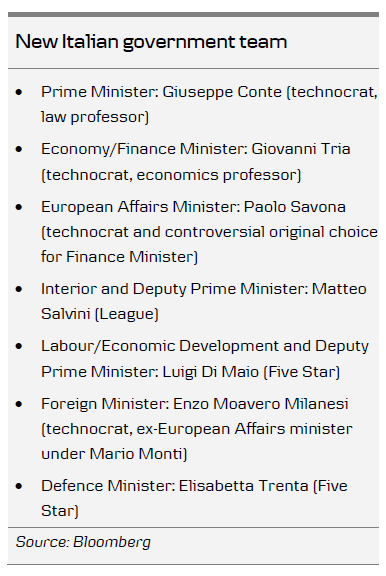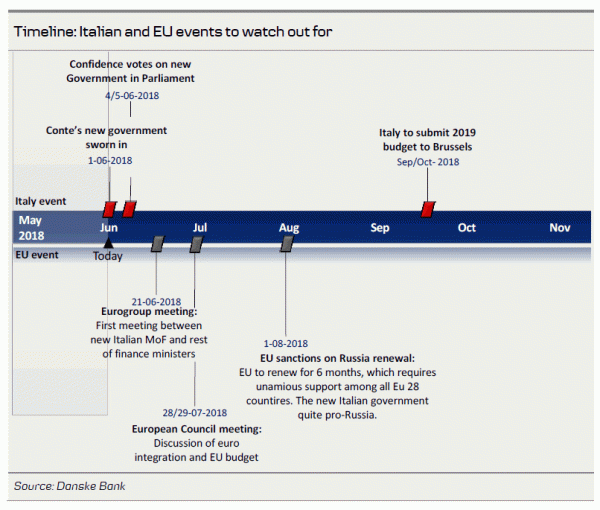- Markets are set to focus on any indications by the new Five Star-League government on its policy agenda and priorities in coming days and weeks.
- We expect to see clashes between the Italian government and the EU on the economic ruleset over coming months.
- Abandonment of fiscal prudence could trigger more rating action in coming weeks.
- We recommend clients take a cautious stance on BTP and focus on other markets such as Spain or France, both of which have widened to Germany/swaps. We expect EUR/USD to retest the 2018 low at 1.1510 over coming weeks.
Following days of uncertainty, the Five Star Movement and League yesterday renewed their coalition deal and received approval for their cabinet from President Sergio Mattarella. Although the initial market reaction was positive, as political uncertainty subsided along with the risk of a new election, we think there will be more struggles ahead and believe that markets will continue to be very headline driven over the next few weeks and months.
EU relations—confrontations likely
The new government will be a combination of technocrats and politicians (see box above right). Following the row with the President over the appointment of Paolo Savona as Finance Minister last week, party leaders agreed on an alternative in the person of Giovanni Tria. Currently an economics professor at Rome’s Tor Vergata University, he is a relatively unknown figure and reported to be close to centre-right circles. In an opinion piece in March 2017, Tria previously advocated monetary financing of government deficits if funds are spent on investment, which would be illegal under EU treaties. This leaves us to expect that he will not be averse to higher fiscal spending as envisioned by the new government. This said, we will need more information about his fiscal policy priorities and hence any comments from him in coming days and weeks on the topic of spending proposals and the relationship with the euro/EU will be of key market focus near term.
Positively, Tria is not considered an outright eurosceptic: although he has previously called for a debate on the euro in both Italy and the rest of Europe, he is not in favour of an outright euro exit (‘the greatest danger is implosion, not exit’). Instead, changing the economic rulebook of the euro area is likely to be the focal point rather than leaving the euro area.
While the risk of an Italian exit from the eurozone is less likely, we think the new government will clash with Germany and other hawkish EU countries on the EU economic ruleset. The reaction of other European countries will depend on how reasonable they consider the new Italian government. There are some proposals that will be a ‘no go’ for the EU, such as monetary financing of deficits given the EU treaties and significant breaches of the EU deficit rules. However, on the other reform proposals such as larger EU public investments and more fiscal flexibility, the European reception of these proposals will depend on two things: (1) the new Italian government seems to respect the EU deficit rule (i.e. funds their spending proposals and income tax reforms with higher taxes in other areas) and (2) that they pick a few initiatives and do not go overboard.
Remember that France is advocating some of the same ideas on euro area integration but doing this while putting its own house in order. If the new Italian government does not do this, then it will be very difficult for France to ally with Italy and it will be an even clearer ‘nein‘ from the German side. Our base case is that confrontations between Italy and Germany will be quite significant.
What to look out for in the next weeks and months?
The cabinet is due to be sworn in today at 16:00 and then it will face confidence votes in parliament on Monday and Tuesday. As the Five Star-League coalition has a majority in both chambers of Parliament, we think this should not constitute a big hurdle.
The euro group meeting on 21 June will surely be interesting, in terms of both the reception that other euro area finance ministers give Tria and the strategy line Italy chooses at these meetings. The next focal point is the heads of states meeting at end-June, when euro area integration and the next EU budget will be on the agenda. Surely, EU officials will now look at this meeting with heightened concerns. What may also be controversial is the renewal in early August of sanctions on Russia for another six months, which would require unanimous support from all EU countries and the new Italian government has more pro-Russia sentiment.
Another key market focus in the near term is any indication from the new government on its policy agenda and priorities. We still think it will be difficult for the Five Star- League coalition government to implement fully its programme in its current form (see also Italian Election Monitor – Rising market pressure set to challenge spending plans, 24 May). One of the government’s first tasks will be to start working on the 2019 budget, which needs to be approved in the autumn and submitted to Brussels by 15 October.
Should the populist government not temper its spending proposals, we could see more action from the rating agencies. Moody’s has already placed Italy on negative watch and a downgrade to Baa1 might come within weeks, if fiscal prudence is abandoned.
BTP market continues to be headline driven – we remain cautious on Italian bonds
Overall, Italian yields are now lower than before the close on Monday, when the sell-off started, and the curve has continued to steepen this morning. We agree with the initial market positive response, as we now have a government in place after months of uncertainty. The BTP market will continue to be alert to headline news on a possible revised fiscal policy programme and comments from rating agencies.
However, the genie is out of the bottle and we would recommend clients take a cautious stance on Italian bonds, until we have more clarity on a revised policy programme. We would rather focus on other periphery markets such as Spain or Portugal, where volatility-adjusted returns look more interesting. We are less concerned about the no-confidence vote against Prime Minister Rajoy today. We are likely to have a government led by the Socialist leader Sanchez and a new election within the next 12 months. However, in contrast to Italy, this could actually lead to a more stable and pro- European majority government emerging and the underlying fundamentals remain very favourable in Spain. France is another possibility after French bonds have widened.
EUR/USD set to fall back near term
Meanwhile, EUR/USD is currently trading higher than it closed one week ago. EUR/USD has been falling recently for a range of different reasons, with Italy being only one of them. Even if the Italian factor takes a backseat, we think the short-term factors for a lower EUR/USD near term – high USD carry and long EUR/USD positioning – remain intact. We expect EUR/USD to fall back over coming weeks towards the low of 1.1510 reached on 29 May.


